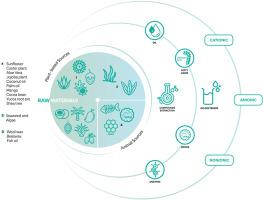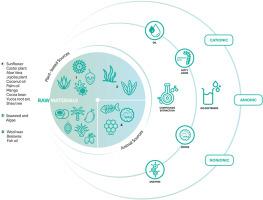使用生物基柔顺剂,在天然织物上获得天然感觉
IF 10
1区 环境科学与生态学
Q1 ENGINEERING, ENVIRONMENTAL
引用次数: 0
摘要
纺织品柔顺剂通过改善织物的柔软度、悬垂度和平滑度等性能,在提高织物舒适度方面发挥着至关重要的作用。然而,传统的柔软剂往往依赖于有毒化合物,对环境和健康构成风险。这篇全面的综述探讨了生物基柔软剂作为纺织工业可持续替代品的新兴领域。生物基软化剂可以从植物油、海洋提取物和动物衍生物等可再生资源中提取,在提供类似性能的同时减少对环境的影响。本文探讨了生物基柔顺剂的分类、机制和好处,同时强调了酶,特别是纤维素酶作为织物柔顺剂的可持续和环保替代品的潜力。诸如川端评估系统(KES-F)和简单测试织物保证(FAST)等评估方法表明,生物基柔顺剂改善了棉花和羊毛等材料的厚度、刚性、延伸性和平滑度等特性。尽管有这些好处,挑战仍然存在,包括软化效果的一致性和天然材料的加工复杂性。生物基软化的持续创新和优化为更可持续、更环保的纺织工业提供了一条途径。本文章由计算机程序翻译,如有差异,请以英文原文为准。


Natural feel on natural fabrics, by using bio-based softeners
Textile softeners play a vital role in enhancing fabric comfort by improving properties such as softness, drape, and smoothness. Traditional softeners, however, often rely on toxic compounds, posing environmental and health risks. This comprehensive review explores the emerging field of bio-based softeners as sustainable alternatives in the textile industry. Bio-based softeners, can be derived from renewable sources like plant oils, marine extracts, and animal derivatives, offering comparable performance while reducing environmental impact. This paper examines the classifications, mechanisms, and benefits of bio-based softeners while emphasizing the potential of enzymes, particularly cellulases, as sustainable and eco-friendly alternatives for fabric softening. Evaluation methods such as the Kawabata Evaluation System (KES-F) and Fabric Assurance by Simple Testing (FAST) demonstrate that bio-based softeners improve characteristics such as thickness, rigidity, extensibility, and smoothness in materials like cotton and wool. Despite these benefits, challenges remain, including consistency in softening effects and processing complexities of natural materials. Continued innovation and optimization in bio-based softening present a pathway toward a more sustainable, environmentally responsible textile industry.
求助全文
通过发布文献求助,成功后即可免费获取论文全文。
去求助
来源期刊

Journal of Cleaner Production
环境科学-工程:环境
CiteScore
20.40
自引率
9.00%
发文量
4720
审稿时长
111 days
期刊介绍:
The Journal of Cleaner Production is an international, transdisciplinary journal that addresses and discusses theoretical and practical Cleaner Production, Environmental, and Sustainability issues. It aims to help societies become more sustainable by focusing on the concept of 'Cleaner Production', which aims at preventing waste production and increasing efficiencies in energy, water, resources, and human capital use. The journal serves as a platform for corporations, governments, education institutions, regions, and societies to engage in discussions and research related to Cleaner Production, environmental, and sustainability practices.
 求助内容:
求助内容: 应助结果提醒方式:
应助结果提醒方式:


